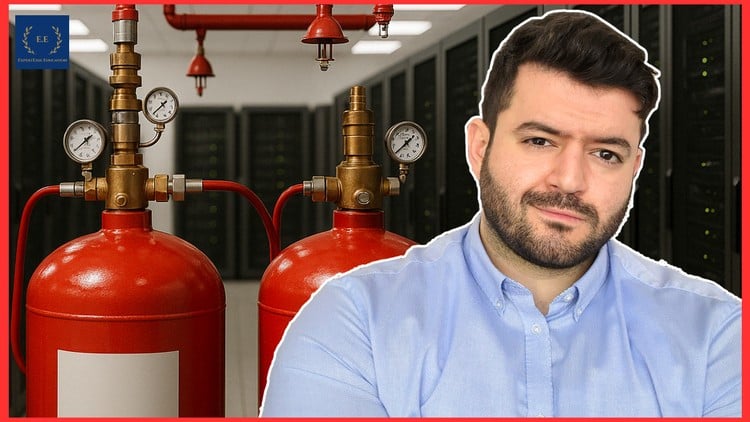
Data Center Fire Infrastructure/Data Center Infrastructure Essentials/Datacenter Systems/Data Center Fire Systems Design
⏱️ Length: 3.1 total hours
⭐ 4.19/5 rating
👥 3,581 students
🔄 June 2025 update
Add-On Information:
Note➛ Make sure your 𝐔𝐝𝐞𝐦𝐲 cart has only this course you're going to enroll it now, Remove all other courses from the 𝐔𝐝𝐞𝐦𝐲 cart before Enrolling!
-
Course Overview
-
- Explore foundational principles governing fire safety in modern data center ecosystems, addressing unique operational hazards from high-density IT equipment and complex power distribution.
- Gain insight into the critical confluence of electrical, mechanical, and IT infrastructure elements contributing to fire risks, understanding their interactions within confined, heat-intensive environments.
- Unpack the strategic importance of robust fire fighting design for business continuity and safeguarding invaluable digital assets against catastrophic data loss and prolonged downtime.
- Delve into comprehensive passive and active fire protection strategies specifically tailored for data center environments, contrasting applications and evaluating efficacy in different contexts.
- Understand the evolving landscape of international and regional standards pertinent to data center fire safety, recognizing the imperative for designs that meet stringent compliance.
- This course offers a concise yet impactful exploration into preventing, detecting, and mitigating fire incidents, emphasizing a holistic approach to data center resilience.
-
Requirements / Prerequisites
-
- A basic understanding of data center components, including racks, servers, networking gear, and power distribution units (PDUs), would be beneficial for contextualizing fire risks.
- Familiarity with general safety protocols and workplace hazard identification will provide a helpful framework for understanding specialized data center safety.
- No prior expertise in fire safety engineering or complex infrastructure design is required, as the course is structured to build knowledge from foundational concepts.
- Access to a reliable internet connection and a device capable of streaming video content is essential for engaging with the course materials effectively.
- An eagerness to learn about specialized safety considerations in high-tech environments and a commitment to professional development in infrastructure design are highly encouraged.
-
Skills Covered / Tools Used
-
- Develop analytical skills to perform comprehensive fire risk assessments tailored to data center environments, considering factors like cable density, airflow dynamics, and thermal management.
- Acquire the ability to critically evaluate various fire detection technologies, including aspirating smoke detection (ASD) and very early warning systems, understanding deployment strategies and false alarm mitigation.
- Grasp principles of containment and compartmentalization in data center design, learning how passive fire protection elements like fire-rated barriers contribute to limiting fire spread.
- Understand operational mechanics and application considerations for advanced fire suppression systems, exploring technologies like water mist and their suitability for different zones within a data center.
- Learn to interpret schematic diagrams and architectural plans with heightened awareness of fire safety implications, identifying potential vulnerabilities and suggesting design enhancements.
- Cultivate an understanding of emergency response protocols specific to data center fire incidents, including power shutdown procedures, evacuation routes, and coordinated efforts with local fire departments.
- Explore methodologies for integrating fire safety systems with broader Building Management Systems (BMS) and Data Center Infrastructure Management (DCIM) platforms for centralized monitoring and control.
-
Benefits / Outcomes
-
- Empower yourself with specialized knowledge to advocate for and implement superior fire safety practices within your organization, becoming a proactive contributor to operational resilience.
- Enhance your professional credibility and marketability in a niche but critical area of infrastructure management, distinguishing you as an expert in data center physical security.
- Contribute directly to reducing potential financial losses due to fire incidents, including equipment damage, data loss, and business interruption, thereby proving significant ROI.
- Gain a strategic perspective on aligning fire safety design with overall data center reliability and availability objectives, understanding its impact on uptime guarantees.
- Facilitate smoother regulatory audits and insurance evaluations by demonstrating a comprehensive grasp of industry standards and best practices in fire prevention and mitigation.
- Develop a critical eye for identifying systemic weaknesses in existing data center layouts concerning fire hazards, enabling you to propose robust retrofit solutions.
- Foster a culture of heightened safety awareness within your team by understanding and communicating the critical importance of specialized fire protection strategies.
-
PROS
-
- Concise and Focused: The 3.1-hour duration provides a highly efficient learning path, concentrating on essential fire fighting design principles without unnecessary filler, ideal for busy professionals.
- High Student Satisfaction: A 4.19/5 rating from 3,581 students indicates a consistently positive and valuable learning experience for a significant user base.
- Timely Content: The June 2025 update ensures the course material is current, reflecting the latest industry standards, technologies, and evolving best practices in data center fire safety.
- Practical Application: The course is designed to equip learners with immediately applicable knowledge, enabling them to make informed decisions and contribute effectively in real-world data center projects.
- Specialized Niche Expertise: Offers focused training in a critical, often overlooked aspect of data center design, providing a competitive edge in a specialized field.
-
CONS
-
- Limited Depth for Advanced Practitioners: While excellent for foundational knowledge, the course’s compact nature may not delve into the extreme intricacies or highly advanced calculations required by seasoned fire protection engineers.
Learning Tracks: English,IT & Software,Network & Security
Found It Free? Share It Fast!